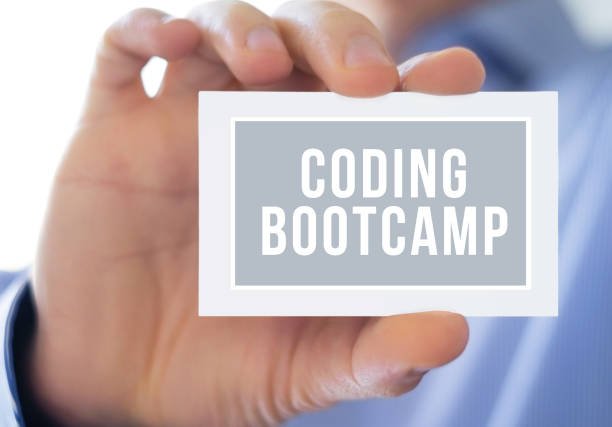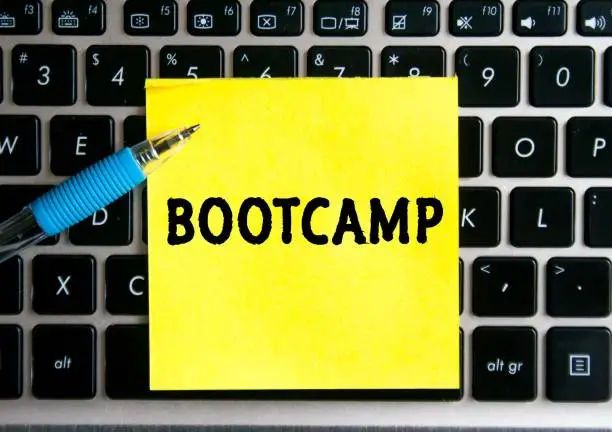How to Pay for Coding Boot camp: Financial Aids in 2024

Are you interested in learning how to pay for coding boot camp? Not everyone finds a traditional college degree program suitable, considering its cost and time commitment. Fortunately, there are alternative paths to gaining technical training and acquiring sought-after skills for entering the workforce. One such option is enrolling in a coding boot camp.

Coding boot camps offer individuals, even those with minimal or no tech background, an opportunity to rapidly acquire computer programming knowledge, with most programs spanning 3-6 months. Many boot camps provide the flexibility of online learning with part-time schedules, catering to the needs of working professionals.
Despite the substantial tuition fees associated with coding boot camps, typically averaging around $13,500 based on data from over 130 programs, there are flexible payment options that may require minimal or no upfront costs. Importantly, this cost is significantly lower than the tuition for a traditional four-year degree program, which often exceeds $50,000.
The potential for lucrative careers after completing a coding boot camp makes the investment in tuition worthwhile. Graduates commonly secure roles as web developers, with a median annual salary of $73,760 in 2019, according to the Bureau of Labor Statistics. Alternatively, they can pursue careers as software developers, earning a median salary of $107,510 that same year.
While coding boot camps offer more cost-effective tuition than traditional college degrees, it’s essential to note that federal financial aid is not accessible for coding boot camps. This raises the question: How can you fund your coding bootcamp? Keep reading to explore financial aid options for coding boot camps.
Is There Federal Financial Aid for Coding Bootcamps?
When considering a coding boot camp, you must rely on something other than a program’s accreditation status to vet the boot camp’s quality. Unlike traditional colleges, boot camps do not hold regional or national accreditation.
As a relatively new industry, coding bootcamps remain largely unregulated. Without accreditation, verifying a boot camp’s quality falls largely on the student. Another drawback of boot camps unaccredited status is that students cannot use federal financial aid, such as federal grants and loans, for coding boot camps.
Many coding boot camps offer financing options through private loans and scholarships if you cannot afford to pay your tuition upfront. Students can also participate in an income share agreement or deferred tuition plan and make payments only after graduation and securing a tech job. While federal financial aid is not available, these alternative financing options provide flexibility for covering the costs of a coding boot camp.
Alternate Financial Assistance Options
1. Loans
While federal financial aid for coding boot camps is unavailable, students can still explore loan options specifically designed for boot camp education. Companies like Skills Fund, Upstart, and Climb Credit collaborate with boot camp providers to offer comparatively lower interest rates than typical private loans.
2. Scholarships
Many coding boot camps provide scholarships that can cover a portion of the tuition cost. These scholarships may target specific groups, such as veterans, women, or underrepresented individuals in the tech industry.
3. Payment Plans
Bootcamps often offer payment plans, allowing students to spread their tuition costs throughout the bootcamp through monthly installments, frequently without interest.
4. Deferred Tuition Plans
Some boot camps allow students to defer tuition payment until after graduation and securing a job in the tech industry. Graduates repay a fixed tuition amount over a predetermined period (typically 2-4 years) once they earn above a minimum threshold.
Note: Job search requirements may apply, so reviewing the terms and conditions is crucial before agreeing to a deferred tuition plan.
5. Income Share Agreements
Unlike deferred tuition plans, income share agreements involve no upfront costs or a minimal deposit. Graduates commit to making monthly payments based on a percentage of their salary after landing a tech job, usually 10-25%. These payments typically span 2-4 years, and certain conditions, like a minimum salary threshold, may apply. It’s essential to thoroughly understand the terms, as graduates may pay more than the initially advertised tuition cost.
Top 16 Coding Bootcamp Scholarships in January 2024
While coding boot camps offer a more affordable alternative to traditional four-year colleges, their tuition costs can still be substantial, averaging around $13,000. To assist you in overcoming this financial barrier and entering the tech industry, we have curated the ultimate guide to coding bootcamp scholarships.
Keep reading to discover the top coding boot camp scholarships available!
Top Coding Bootcamp Scholarships
1. “Tuition Solution” Scholarship for STEM Students
- Eligibility: High school seniors, college students, and graduate students interested in STEM
- Amount: $500
- Deadline: January 31, 2024
2. Coding Dojo Fresh Start Fund Scholarship
- Eligibility: Requires full-time enrollment in the Coding Dojo Full-Time Bootcamp
- Amount: Up to $1,500 for those making less than $40,000 per year
- Deadline: Varies by enrollment deadline
3. Code Platoon Scholarships
- Eligibility: Veterans enrolling in a Code Platoon program (requirements vary slightly based on scholarship)
- Amount: Between $13,000 and $16,000 (varies based on the specific scholarship)
- Deadline: Varies
4. Turing School BIPOC & Inclusion Scholarships
- Eligibility: Students accepted into the Turing School and belonging to a group underrepresented in tech (LGBTQ+ people, women, racial minorities, people with disabilities, and veterans)
- Amount: $4,000
- Deadline: 5 weeks before classes begin (depending on the specific program)
5. Tech Elevator Represent Tech Scholarship
- Eligibility: Applicants should be part of an underrepresented group in the tech industry and enroll in the next available Tech Elevator cohort
- Amount: $13,175 (85% of tuition cost)
- Deadline: 7 weeks before the start of the individual’s selected program
6. Galvanize Scholarship
- Eligibility: U.S. citizens or permanent residents accepted to either the Hack Reactor at Galvanize Software Engineering Immersive (SEI) Program or the Galvanize Data Science Immersive (DSI) Program
- Amount: Full tuition
- Deadline: Varies
7. Horatio Alger Career & Technical Scholarships
- Eligibility: Students enrolled in eligible technical programs
- Amount: $2,500
- Deadline: Rolling
- Additional Coding Bootcamp Scholarships
8. We Stand Together Scholarship
- Eligibility: Black or African-American students enrolling in either the Data Science or Hack Reactor Software Engineering Immersive Bootcamp through Galvanize
- Amount: Full tuition
- Deadline: Varies (refer to your specific program’s enrollment deadline)
9. Code Fellows Diversity Scholarship
- Eligibility: Individuals from underserved backgrounds with little representation in the tech industry enrolling in a Code Fellows course
- Amount: Varies based on financial need
- Deadline: Contact admissions for the deadline and application link
10. Digitalcrafts Builder Scholarship
- Eligibility: Students from underrepresented groups in tech, including female, Black, and Latine students enrolling in a Digitalcrafts program
- Amount: $1,000 (Part-time program) or $1,500 (Full-time program)
- Deadline: Depends on the application deadline for your intended program
11. We Can Code It Low-Income & Diversity Scholarships
- Eligibility: Low-income or underrepresented students enrolling in a We Can Code It bootcamp
- Amount: Up to $2,000
- Deadline: Depends on the specific program enrollment deadline
12. Zipcode Wilmington Need-Based Scholarship
- Eligibility: Students enrolling in a Zipcode Wilmington coding program with a household income 200% below the national poverty level
- Amount: $6,000
- Deadline: By the application deadline of the intended program
13. DeltaV Diversity Tuition Scholarship
- Eligibility: Students enrolling in a DeltaV course who belong to a population underrepresented in technology (e.g., women, veterans, low-income, racial minorities, those with disabilities)
- Amount: Varies
- Deadline: Varies (based on the specific program)
14. Brainstation Scholarships
- Eligibility: Separate scholarships available for women, underrepresented populations in tech, recent college grads, veterans, and entrepreneurs enrolling in Brainstation programs
- Amount: Varies
- Deadline: Must be submitted and approved before enrollment in a Brainstation program
15. LEARN Academy Diversity Scholarship
- Eligibility: Individuals enrolling in a LEARN Academy course or boot camp who belong to an underrepresented community in tech
- Amount: $2,000 off tuition
- Deadline: Depends on the intended program’s application deadline
16. Flatiron School Access Scholarship
- Eligibility: Female or other underrepresented students enrolling in a Flatiron School course with no prior experience working in the role they’re being trained for
- Amount: Between $1,000 and $3,000 (May qualify for an additional grant, up to $50,000)
- Deadline: None! (Ongoing program)
Tips on Winning Coding Bootcamp Scholarships
As the popularity of coding boot camps rises, so does the scholarship competition. Given the nontraditional nature of coding boot camps, scholarship applications may require additional materials, such as a resume. Here are some tips to enhance your chances of winning coding bootcamp scholarships:
1. Craft a Scholarship Resume:
Create a comprehensive scholarship resume highlighting your educational background, work experience, and relevant achievements.
Showcase your passion for coding and any related skills or projects.
2. Emphasize Your Unique Story:
Use your essay to convey why you’ve chosen to enroll in a coding boot camp.
Share your unique experiences and perspectives that make your story stand out.
3. Follow Guidelines:
Adhere to the specific guidelines outlined in the scholarship application.
Pay attention to word limits, essay topics, and any additional requirements.
4. Articulate Goals:
Clearly express your goals and how attending the coding boot camp will contribute to your professional and personal development.
5. Demonstrate Commitment:
Showcase your commitment to the coding field and your dedication to completing the boot camp.
Highlight any self-learning or coding-related activities you’ve undertaken.
6. Seek Professional Advice:
Consider seeking guidance from mentors, teachers, or professionals in the coding industry to refine your application.
7. Proofread Thoroughly:
Ensure your application is free of errors by thoroughly proofreading all written components.
Ask someone else to review your application for additional feedback.
8. Utilize Essay Writing Guides:
If required to submit an essay, use guides for writing 250-word and 500-word essays to structure your content effectively.
By carefully preparing your scholarship application and emphasizing your unique qualities, you can increase your chances of securing funding for your coding bootcamp journey.
Tips for Coding Bootcamp Students
Embarking on a coding bootcamp journey can be both exciting and challenging. To enhance your experience and prepare for success, consider the following tips:
1. Explore Free Online Coding Programs:
Take advantage of free online coding courses to familiarize yourself with coding concepts.
Platforms like Codecademy, Khan Academy, and freeCodeCamp offer valuable resources.
2. Build a Strong Foundation:
Strengthen your foundational knowledge in programming languages, algorithms, and problem-solving.
Focus on mastering key concepts that will serve as the building blocks for more advanced topics.
3. Engage with Coding Challenges:
Practice coding challenges regularly to improve problem-solving skills.
Websites like HackerRank, LeetCode, and Codewars offer a variety of challenges for all skill levels.
4. Create Personal Coding Projects:
Undertake personal coding projects to apply your skills in real-world scenarios.
Building a portfolio of projects will showcase your abilities to potential employers.
5. Join Coding Communities:
Connect with like-minded individuals by joining coding communities or forums.
Participate in discussions, seek advice, and share your experiences with others.
6. Attend Meetups and Networking Events:
Attend coding meetups and networking events in your local area.
Building a network within the coding community can provide valuable insights and support.
7. Stay Consistent with Learning:
Establish a consistent study routine to reinforce your learning.
Regular, focused practice is key to mastering coding concepts.
8. Seek Mentorship:
Find a mentor within the coding community or your boot camp program.
A mentor can offer guidance, share insights, and encourage.
9. Utilize Bootcamp Resources:
Take full advantage of the resources offered by your coding bootcamp.
Attend workshops, seek help from instructors, and collaborate with fellow students.
10. Stay Resilient and Positive:
Coding bootcamps can be intense, so maintain a positive mindset and stay resilient.
Embrace challenges as opportunities for growth and learning.
Remember, you’re not alone in your coding journey. By leveraging free online resources, engaging with communities, and staying dedicated to learning, you can enhance your skills and maximize your coding boot camp experience.
Income Share Agreements: A Flexible Financial Option
For students exploring coding bootcamp scholarships, income share agreements (ISAs) present a modern and flexible model of educational finance. In an ISA, students commit to repaying a certain percentage of their post-graduation income for a specified period instead of repaying a fixed borrowed amount. This innovative approach offers several benefits:
1. Flexible Repayment:
Unlike traditional loans, ISAs do not require upfront payments or a fixed repayment amount.
Payments are tied to the graduate’s income, providing flexibility and alignment with financial capabilities.
2. No Cash Upfront:
Students are not burdened with immediate financial obligations, making education more accessible.
The absence of upfront costs reduces financial barriers for individuals considering coding bootcamps.
3. Common in Coding Bootcamps:
ISAs are particularly prevalent in the coding bootcamp education sector.
Many coding bootcamps offer their ISAs, allowing students to tailor repayment plans to their income levels.
4. Limited Credit History Consideration:
ISAs often prioritize earning potential over credit history.
This makes ISAs a suitable option for students with limited credit history seeking financial assistance for their education.
5. Third-Party Services:
Besides boot camp-provided ISAs, third-party servicers also offer income share agreements.
This diversity allows students to explore various ISA options and choose the one that best suits their needs.
While ISAs offer flexibility, it’s important for students to review the terms and conditions of any agreement carefully. Understanding the percentage of income, repayment period, and other specifics will help individuals make informed decisions about their financial commitment after completing a coding boot camp.

Understanding the Cost of Coding Bootcamps and Potential Returns
Have you wondered about the cost of coding bootcamps and whether the investment is worthwhile? Let’s delve into the numbers.
Average Cost of Coding Bootcamps:
Coding boot camps offering accelerated tech education come with varying price tags. According to the Bureau of Labor Statistics, the average web developer earns $77,200 annually. Bootcamp costs range from $1,480 to $30,000, with a median of $13,580 (BestColleges data).
Discipline-Specific Pricing:
Costs differ based on the technical discipline.
Web development and UX/UI design boot camps average around $12,500, while data science and software engineering boot camps may cost approximately $15,000.
University-Affiliated vs. Private Providers:
University-affiliated boot camps may offer cost advantages compared to private providers like Hack Reactor or General Assembly.
Private schools provide diverse payment options, including scholarships, coding bootcamp loans, and borrower/cosigner programs.
Return on Investment:
Despite upfront expenses, a coding boot camp’s potential return on investment is substantial. As per the Council on Integrity in Results Reporting (CIRR), boot camp graduates exhibit high employment rates, with around 79% finding employment within 180 days after graduation (data from January to June 2019).
Skillcrush Program Insights:
Skillcrush’s flagship program, for instance, costs approximately $2,499 before any applicable discounts.
Programs like Skillcrush’s Break Into Tech offer accessible options within this broader landscape.
Consideration for Aspiring Coders:
While costs vary, understanding potential earning outcomes, employment rates, and available payment options can aid aspiring coders in making informed decisions.
While the cost of coding boot camps may seem significant initially, the accelerated learning and high employment rates position them as valuable investments in the rapidly evolving tech industry.
Exploring Payment Options for Coding Bootcamps
As you embark on your coding bootcamp journey, understanding how to finance your education is crucial. Individuals employ various methods to pay for coding boot camps, tailoring their approach to fit their financial circumstances.
1. Scholarships:
Some coding schools offer scholarships to support aspiring learners. For instance, Galvanize and Coding Dojo provide scholarships for women in tech, diversity, and military service members.
2. Income Share Agreements (ISAs):
ISAs are a popular option where students defer tuition upfront and, in return, commit to a percentage of their future earnings. Lambda School, App Academy, Thinkful, and Flatiron School are among the boot camps offering ISAs.
While ISAs offer flexibility, being aware of potential risks is crucial. For comprehensive insights, understanding the terms and conditions is essential.
3. Student Loans and Financing:
Student loans and financing programs through entities like Climb Credit or Ascent are viable alternatives. Hack Reactor, Flatiron School, and General Assembly accept funding through these avenues.
While student loans may offer lower interest rates, applicants’ credit scores may influence approval, though some lenders permit cosigners.
4. Cash Payments:
Many students opt to pay for coding bootcamps upfront or through installment plans. Coding Dojo, Actualize, Covalence, Bloc, and Skillcrush are examples that accommodate various payment structures.
Skillcrush’s affordability is rooted in its mission to empower underrepresented groups with accessible and affordable tech education. Monthly installment or upfront payment options for Skillcrush’s programs exemplify this commitment.
5. Choosing the Right Path:
Consider your financial situation, preferences, and the terms associated with each payment method when deciding how to fund your coding education.
Skillcrush’s commitment to affordability and accessibility underscores its dedication to serving diverse student populations.
Obtaining Student Loans for Coding Bootcamps: A Guide
Disclaimer: The information provided here is for informational purposes only and should not be considered legal, tax, investment, financial, or other advice.
1. Choose Bootcamp-Focused Loans:
When considering student loans for coding bootcamps, opt for personal loans designed specifically for boot camp costs. Avoid high-interest personal loans or credit cards, as bootcamp loans often have lower interest rates and more favorable repayment terms.
2. Explore Private Lenders:
Private lenders like Skills Fund and Climb Credit partner directly with coding bootcamps to offer loans to attendees. Compare interest rate terms and assess options for deferment and forbearance in case of repayment difficulties.
3. Utilize GI Bill Benefits:
Veterans with GI Bill benefits can explore coding boot camps eligible for GI Bill funds. The U.S. Department of Veterans Affairs provides a search tool to identify qualifying boot camps. Additionally, consider the VET TEC program, which aligns with GI Bill eligibility without depleting existing GI Bill time.
4. Employer-Sponsored Training:
Check with your employer to determine if they offer professional development and training opportunities. Some employers provide free training, and a coding boot camp may qualify as part of your professional development.
Navigating student loans for coding boot camps involves selecting bootcamp-focused loans, exploring private lenders, leveraging GI Bill benefits for veterans, and considering employer-sponsored training options. Prioritize loans with favorable terms to ensure a smooth repayment process.
Conclusion on How to Pay for Coding Boot camp
Financing your coding boot camp education in 2024 involves exploring various financial aid options tailored to your circumstances. While federal financial aid is unavailable for coding bootcamps, numerous alternatives can help ease the financial burden. Scholarships offered by coding schools, income share agreements (ISAs), student loans, and cash payments in installments are among the viable options.
Additionally, certain bootcamps provide specialized scholarships for underrepresented groups, veterans, and individuals with specific backgrounds. Understanding the array of financial aid possibilities allows prospective students to make informed decisions and embark on their coding journey with a clear financial plan.
RELATED
Unlock the $10000 DoorDash Grant for Aspiring Entrepreneurs
Trusted Moving Companies in Grants Pass Oregon 2024
10X Your Brand with Grant Cardone Digital Marketing Strategies
Hart Insurance Grants Pass Oregon 2024 – Your Trusted Coverage Partner.
Massachusetts Business Grants 2024 – A Business Grants Guide.


